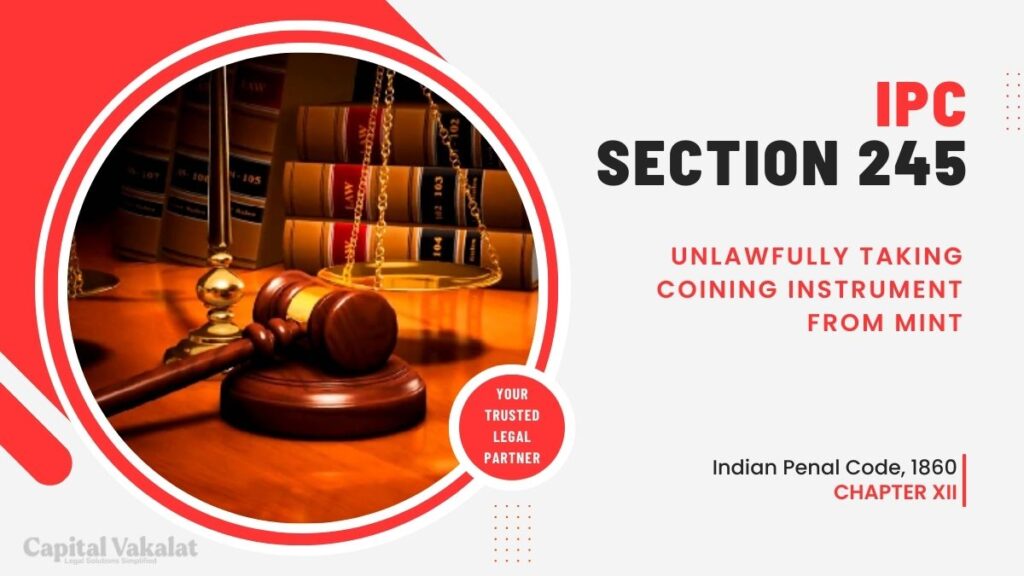In the realm of criminal law, Section 245 of the Indian Penal Code (IPC) deals with the unlawful taking of a coining instrument from a mint. This provision is a crucial element in the legal framework that seeks to preserve the integrity of the monetary system and combat counterfeiting.

In this article, we will delve into the nuances of Section 245 IPC, exploring its historical context, legal aspects, punishments, and its significance in contemporary society.
Understanding the Offense of Unlawfully Taking Coining Instrument
Unlawfully taking a coining instrument from a mint pertains to the illegal possession, theft, or tampering of tools used for creating counterfeit currency. Counterfeiting has been a perennial issue that undermines trust in the monetary system, and Section 245 IPC plays a pivotal role in deterring such criminal activities.
Historical Perspective: The Coining of Money
To comprehend the significance of Section 245 IPC, it’s essential to trace the history of coinage and the evolution of counterfeiting. From ancient civilizations to the modern era, the creation of counterfeit currency has posed a threat to the economic stability of nations. We will explore how counterfeiting has evolved over time and how the law has adapted to counter this threat.
The Legal Framework of Section 245 IPC
This section will provide a detailed overview of Section 245 of the Indian Penal Code. It will explain the legislative intent behind this provision and its place within the broader legal framework. Understanding the legal foundation is crucial in comprehending the offense and its implications.
Elements of the Offense
In this section, we will break down the essential elements that constitute the offense under Section 245 IPC. This will include discussing what qualifies as a “coining instrument,” the act of taking it unlawfully, and the requisite intent to commit an offense. Clarifying these elements is fundamental for a thorough understanding of the law.
Punishments and Penalties
An important aspect of any legal provision is the consequences for violation. Section 245 IPC outlines the punishments and penalties for unlawfully taking a coining instrument. This section will elucidate the potential repercussions, which may include imprisonment, fines, or both.
Notable Cases and Precedents
The best way to understand the practical application of Section 245 IPC is by examining past cases and legal precedents. We will analyze notable cases where individuals were charged under this provision, exploring the circumstances, outcomes, and the impact on society.
The Significance of Section 245 IPC
This section will discuss the broader implications of Section 245 IPC on the economy, monetary system, and society as a whole. Understanding the role it plays in maintaining the integrity of currency is paramount in appreciating its significance.
Challenges in Enforcing Section 245
While Section 245 IPC serves as a powerful tool to combat counterfeiting, it is not without challenges. This section will delve into the difficulties faced by law enforcement agencies in enforcing this provision and the measures taken to address these challenges.
Conclusion
In conclusion, Section 245 IPC is a crucial component of India’s legal framework, dedicated to combating the illicit production of counterfeit currency. By understanding its historical context, legal aspects, punishments, and significance, we can appreciate its role in maintaining the integrity of the monetary system.
Frequently Asked Questions
What are the potential punishments for violating Section 245 IPC?
The punishments may include imprisonment, fines, or both, depending on the circumstances and severity of the offense.
How does Section 245 IPC contribute to maintaining the integrity of the monetary system?
Section 245 IPC deters counterfeiting by imposing legal consequences on those who unlawfully possess or tamper with coining instruments, thus safeguarding the monetary system’s integrity.
Are there any recent developments or amendments related to Section 245 IPC?
It’s advisable to consult legal sources for the most up-to-date information regarding any recent developments or amendments to Section 245 IPC.
What should I do if I suspect someone is involved in counterfeiting or unlawfully taking coining instruments?
If you suspect illegal activities related to counterfeiting, it’s crucial to report your suspicions to the appropriate law enforcement authorities, such as the local police or the Reserve Bank of India, to take the necessary actions.